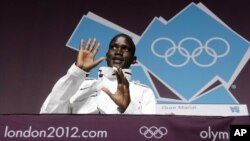Guor Marial, a marathon runner, is a man without a country at the 2012 Olympics. He will compete Sunday in London as an independent athlete under the Olympic flag.
The 28-year-old athlete is from what is now South Sudan, a year-old country that has priorities other than sports.
He fled war-torn Sudan in 1993 during the civil war, eventually making his way to the U.S. where he attended high school and college, and now lives in the southwestern U.S. state of Arizona. Marial has a so-called "green card," which allows him to live in the United States, but he is not a U.S. citizen. He also does not have citizenship or a passport from South Sudan. If he did, he still would not be able to represent his homeland because South Sudan does not have an Olympic committee.
Marial, who has not seen his family since he fled, says they are making the 50-kilometer hike from their village, which does not have electricity, to the town of Panrieng to watch him on television run the Olympic marathon.
The International Olympic Committee had wanted Marial to run under the Sudanese flag, but he refused. He said it would have been a betrayal of his country, his family and all those who died in the war. He lost 28 family members in the violence of the civil war.
He learned just one week before the start of the London Games that he would be allowed to compete unaffiliated with any nation.
He is not the only refugee from South Sudan at the Olympics. Chicago Bulls player Luol Deng, who grew up in London after fleeing Africa, is on Britain's basketball team, and Lopez Lomong, who has U.S. citizenship, is a 5,000 meter runner.
Marial says he has no expectations about Sunday's race, calling it "unpredictable."
His best time for running the 42-kilometer course is 2 hours, 12 minutes and 55 seconds. The world record is 2 hours, 3 minutes and 38 seconds.
The 28-year-old athlete is from what is now South Sudan, a year-old country that has priorities other than sports.
He fled war-torn Sudan in 1993 during the civil war, eventually making his way to the U.S. where he attended high school and college, and now lives in the southwestern U.S. state of Arizona. Marial has a so-called "green card," which allows him to live in the United States, but he is not a U.S. citizen. He also does not have citizenship or a passport from South Sudan. If he did, he still would not be able to represent his homeland because South Sudan does not have an Olympic committee.
Marial, who has not seen his family since he fled, says they are making the 50-kilometer hike from their village, which does not have electricity, to the town of Panrieng to watch him on television run the Olympic marathon.
The International Olympic Committee had wanted Marial to run under the Sudanese flag, but he refused. He said it would have been a betrayal of his country, his family and all those who died in the war. He lost 28 family members in the violence of the civil war.
He learned just one week before the start of the London Games that he would be allowed to compete unaffiliated with any nation.
He is not the only refugee from South Sudan at the Olympics. Chicago Bulls player Luol Deng, who grew up in London after fleeing Africa, is on Britain's basketball team, and Lopez Lomong, who has U.S. citizenship, is a 5,000 meter runner.
Marial says he has no expectations about Sunday's race, calling it "unpredictable."
His best time for running the 42-kilometer course is 2 hours, 12 minutes and 55 seconds. The world record is 2 hours, 3 minutes and 38 seconds.
Some information for this report was provided by Reuters.





